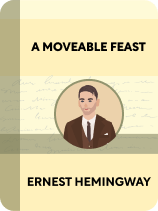

This article is an excerpt from the Shortform book guide to "A Moveable Feast" by Ernest Hemingway. Shortform has the world's best summaries and analyses of books you should be reading.
Like this article? Sign up for a free trial here .
What are some of the most noteworthy A Moveable Feast quotes? How does Hemingway describe his life in Paris?
A Moveable Feast is Ernest Hemingway’s memoir from his time living in Paris. At that time, Hemingway was hungry, poor, and happy. He lived with his wife Hadley and befriended many literary giants.
Continue below for quotes from A Moveable Feast.
Quotes From A Moveable Feast
A Moveable Feast tells the story of a young man of the post-World War I “Lost Generation” and his encounters with literary giants like James Joyce, Ezra Pound, T.S. Eliot, and F. Scott Fitzgerald, as well as famous places like bookstore Shakespeare and Company and its proprietor Sylvia Beach. Many of these writers served as mentors and friends, and Hemingway used many of their techniques in his work, which is famously sparse, simple, and direct.
Here are some of the top A Moveable Feast quotes with explanations.
“If you are lucky enough to have lived in Paris as a young man, then wherever you go for the rest of your life, it stays with you, for Paris is a moveable feast.”
Ernest Hemingway’s A Moveable Feast is a collection of vignettes about his time in Paris between 1921 and 1926. During those years, Hemingway took copious notes about his life. He forgot about them until 1956, when he learned he’d left them in a trunk in the basement of the Hôtel Ritz in Paris in 1930. Upon rediscovering the notes on his years in Paris, he set about writing what would become A Moveable Feast.
“There is never any ending to Paris and the memory of each person who has lived in it differs from that of any other. We always returned to it no matter who we were or how it was changed or with what difficulties, or ease, it could be reached. Paris was always worth it and you received return for whatever you brought to it. But this is how Paris was in the early days when we were very poor and very happy.”
For Hemingway, Paris was always an important anchor—it changed while he changed, but it was and would always be Paris. He found that whatever he put into Paris, it gave back to him. Hemingway had put all of himself into living in Paris, and he had incredible years there, learning to write. He never lived in a large city again. But he believed Paris lived in different forms in the memories of people who spent time there, and it evoked powerful feelings. A Moveable Feast reflects Hemingway’s memories of Paris when he was young, poor, and happy.
“You expected to be sad in the fall. Part of you died each year when the leaves fell from the trees and their branches were bare against the wind and the cold, wintery light. But you knew there would always be the spring, as you knew the river would flow again after it was frozen. When the cold rains kept on and killed the spring, it was as though a young person died for no reason.”
With spring’s arrival, all problems evaporated. Hemingway wrote in the early morning before the shops opened. A goatherd came down the street and a woman walked outside and purchased goat’s milk. Hemingway never had much money, but he and Hadley didn’t think of themselves as poor—rather, they considered themselves intellectually superior and didn’t trust the rich. They were still able to eat and drink well, but cheaply, in Paris. Often, Hemingway and Hadley went to the races. They had some successes betting on horses, but they were still poor, and Hemingway was often hungry. However, he believed this cleared his mind and allowed him to focus on his writing.
“I thought that all generations were lost by something and always had been and always would be.”
Stein told Hemingway that she liked his stories, but while his writing was new and unique, he wasn’t good enough yet to be published in any big newspapers or magazines. Also, their sexual content made his stories unpublishable. Hemingway responded that he was trying to authentically reflect the way people talked, which Stein said was pointless if he couldn’t sell his work. Stein also contended Hemingway was part of a “lost generation”—those who had fought in the war and were now drinking themselves to death. This made Hemingway think about Stein’s own shortcomings on his walk home, and he wondered whether he was part of a lost generation or whether she was lost herself. He realized that all generations were lost in their own way—each affected by different things while growing up.
“But sometimes when I was starting a new story and I could not get it going, I would sit in front of the fire and squeeze the peel of the little oranges into the edge of the flame and watch the sputter of blue that they made. I would stand and look out over the roofs of Paris and think, ‘Do not worry. You have always written before and you will write now. All you have to do is write one true sentence. Write the truest sentence that you know.’ So finally I would write one true sentence, and then go on from there.”
Hemingway usually wrote in his apartment, and he didn’t stop writing until he knew where his story was going, to make sure he had something to write about the next day. However, occasionally he’d have writer’s block in trying to start something new, so he’d sit at the fire and just try to write one “true sentence.” Often, this took the form of a simple declarative statement that could begin a story. After writing a “true sentence,” he didn’t have any trouble continuing a story from there.

———End of Preview———
Like what you just read? Read the rest of the world's best book summary and analysis of Ernest Hemingway's "A Moveable Feast" at Shortform .
Here's what you'll find in our full A Moveable Feast summary :
- Ernest Hemingway's autobiography about his life in Paris between 1921 and 1926
- How Hemingway knew so many other great authors of the time
- Why F. Scott Fitzgerald was a toxic yet valuable friend to Hemingway






